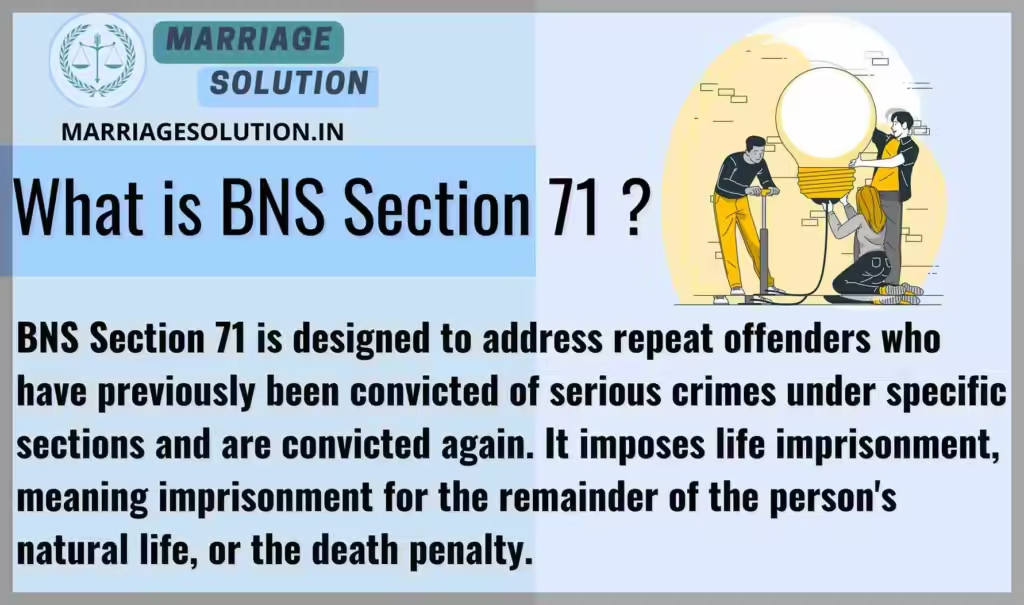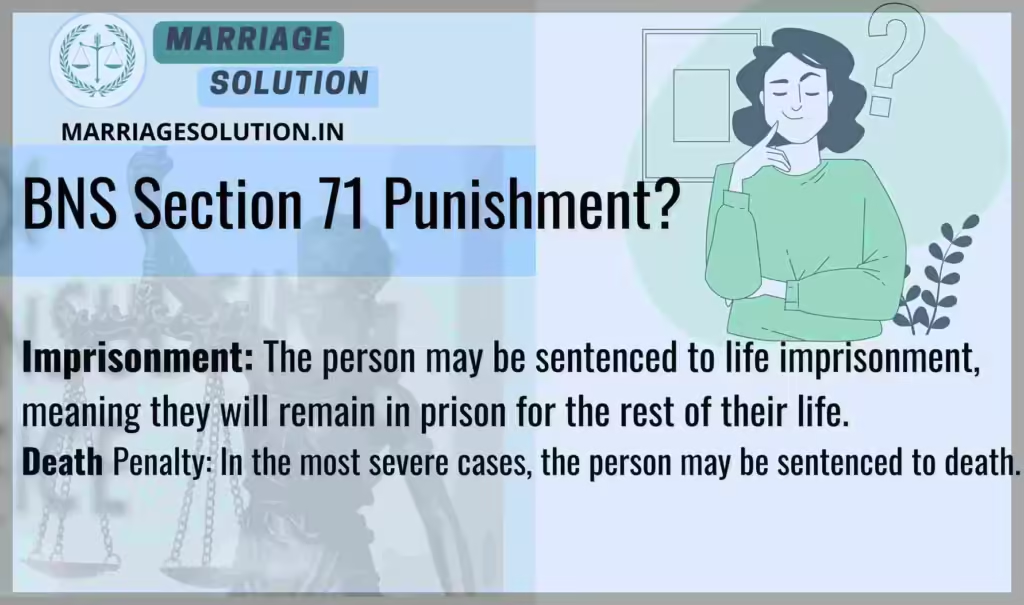Introduction of BNS 71
BNS 71 deals with the punishment for individuals who have been previously convicted of certain serious offenses and commit another offense under the same sections. The law imposes severe penalties to deter repeat offenders and ensure public safety.
- Introduction of BNS 71
- What is section 71 of BNS ?
- BNS Section 71 in Simple Points
- Section 71 BNS Overview
- BNS 71 Punishment
- BNS 71 bailable or not ?
- Bharatiya Nyaya Sanhita Section 71
- BNS Section 71 FAQs
- If you need support with court proceedings or any other legal matters, don’t hesitate to reach out for assistance.
What is section 71 of BNS ?
BNS Section 71 is designed to address repeat offenders who have previously been convicted of serious crimes under specific sections and are convicted again. It imposes life imprisonment, meaning imprisonment for the remainder of the person’s natural life, or the death penalty.

BNS Section 71 in Simple Points
If a man has sexual intercourse with a woman by making a false promise of employment, promotion, or other professional benefits, or by misusing his position of authority or influence, such act will be treated as a punishable offence.
Punishment: The offender shall be punished with imprisonment that may extend up to ten years, and shall also be liable to pay a fine.
(This provision corresponds to IPC Section 376C, but has been restructured and updated under the Bharatiya Nyaya Sanhita (BNS), 2023.)
1. Meaning of Section 71
BNS Section 71 deals with situations where a person in a position of authority or professional influence exploits a woman by making false promises related to employment, promotion, or career opportunities to obtain sexual intercourse.
It recognises that consent obtained under deception or misuse of power is not valid consent.
2. Purpose of Section 71
The purpose of this section is to:
- Prevent workplace and authority-based exploitation.
- Protect women from being deceived with fake assurances of career or employment benefits.
- Ensure that those in positions of power are held legally accountable if they misuse their authority for sexual favors.
3. Essential Ingredients of Section 71
For an act to fall under this section, the following conditions must be satisfied:
- Deception or False Promise: The offender must have made a false assurance of employment, promotion, or career benefit.
- Position of Authority or Influence: The offender must be in a position where he could influence the victim’s career or future.
- Consent under Misrepresentation: The woman’s consent must have been obtained by deception, not freely given.
- Sexual Intercourse: There must be proof of sexual intercourse based on such false promises.
4. Punishment under BNS Section 71
- Imprisonment: Up to 10 years.
- Fine: In addition to imprisonment, the offender must pay a fine.
This strict punishment reflects the seriousness of exploitation under professional or authoritative capacity.
5. Examples of Section 71 in Action
- Example 1: A manager falsely promises an employee a promotion if she agrees to sexual relations. This falls under Section 71.
- Example 2: A job recruiter assures a candidate of employment and deceives her into sexual intercourse. This is punishable under this section.
- Counter-Example: A consensual relationship between two colleagues without misuse of power or false promises does not attract this section.
6. Importance of Section 71
BNS Section 71 is crucial because it:
- Protects women from exploitation in workplaces and professional settings.
- Reinforces that consent obtained through deceit or misuse of authority is not valid consent.
- Ensures accountability for those in power, preventing the abuse of professional or official positions for personal gratification.
This section strengthens women’s rights and upholds dignity in professional and social environments.
Section 71 BNS Overview
BNS Section 71 deals with the punishment for individuals who have been convicted more than once for specific serious crimes. It imposes strict penalties, including life imprisonment or the death penalty, to prevent repeat offenses and to protect society.
BNS Section 71 Key Points
Focus on Repeat Offenders: This section specifically targets individuals who have been previously convicted of serious crimes and then commit another offense under the same sections. It aims to prevent habitual criminal behavior.
Punishment Severity: The section mandates life imprisonment, meaning imprisonment for the remainder of the person’s natural life, or the death penalty. This severe punishment is intended to serve as a strong deterrent against repeated criminal behavior.
Applicable Sections: BNS Section 71 applies to those who have been convicted under sections 64, 65, 66, or 70 of the Bharatiya Nyaya Sanhita and are subsequently convicted of another offense under any of these sections.
Cognizable Offense: The crimes under this section are cognizable, meaning that the police can arrest the accused without a warrant, reflecting the seriousness of the offenses covered by this section.
Non-Bailable: Offenses under BNS Section 71 are non-bailable, meaning that the accused does not have the right to be released on bail and must remain in custody during the trial.
Non-Compoundable: The offenses under this section are non-compoundable, which means they cannot be settled outside of court, ensuring that justice is served through the legal process.
Trial by Court of Session: The trial for offenses under this section must be conducted by the Court of Session, which is a higher court, indicating the gravity of the offenses.
Life Imprisonment Explained: Life imprisonment under this section means that the individual will remain in prison for the remainder of their natural life, with no possibility of release.
Death Penalty: The section allows for the death penalty in cases where the repeat offense is particularly egregious, reflecting the ultimate punishment available under the law.
Deterrent Effect: The purpose of this section is to deter individuals from committing repeated offenses by imposing the harshest possible penalties, thereby protecting society from habitual criminals.
Example of BNS Section 71
Imagine a person named Raj has been convicted of a serious crime under BNS Section 64 and served his sentence. After being released, he commits another crime under the same section. Under BNS Section 71, because Raj is a repeat offender, he may be sentenced to life imprisonment or even the death penalty, depending on the severity of his crime. This example illustrates how BNS Section 71 works to prevent habitual offenders from causing further harm.
BNS 71 Punishment
Imprisonment for Life: The person may be sentenced to life imprisonment, meaning they will remain in prison for the rest of their life.
Death Penalty: In the most severe cases, the person may be sentenced to death.

BNS 71 bailable or not ?
BNS Section 71 is a non-bailable offense, meaning that the accused does not have the right to be released on bail and must remain in custody during the trial.
Comparison: BNS Section 71 vs IPC 376E
| Section | Offence | Punishment | Bailable / Non-Bailable | Cognizable / Non-Cognizable | Trial By |
|---|---|---|---|---|---|
| BNS Section 71 | Punishment for repeat offenders who are convicted again under Sections 64, 65, 66 or 70 of BNS. | Life imprisonment for the remainder of natural life or death penalty. Ensures maximum punishment for habitual criminals. | Non-Bailable | Cognizable | Sessions Court |
| IPC (Old Provisions) | Habitual offenders were punished under IPC Sections 75 (general repeat offenders) and 376E (repeat rape offenders). | Life imprisonment (often interpreted as 14 years or more with remission) or death penalty in repeat rape cases under Section 376E. | Non-Bailable | Cognizable | Sessions Court |
BNS Section 71 FAQs
What does BNS Section 71 address?
It deals with the punishment for repeat offenders who have previously been convicted under specific sections.
What is the punishment under BNS Section 71?
The punishment is either life imprisonment or the death penalty.
Is BNS Section 2071 a bailable offense?
No, it is a non-bailable offense.
Who conducts the trial for offenses under BNS Section 71?
The trial is conducted by the Court of Session.
What does “life imprisonment” mean under BNS Section 71?
It means imprisonment for the remainder of the person’s natural life.
What sections does BNS Section 71 apply to?
It applies to repeat offenses under sections 64, 65, 66, or 70.
Conclusion
BNS Section 71 ensures that habitual offenders of serious crimes face the strictest legal consequences. By imposing either life imprisonment or the death penalty, the law acts as a deterrent against repeated criminal behavior while ensuring society is protected from dangerous individuals. Its non-bailable, cognizable, and non-compoundable nature reflects the gravity of such crimes and the commitment of the justice system to safeguard public safety.
Need Legal Support?
If you are dealing with court cases, marriage problems, or any other legal issue, our team at Marriage Solution – Lawyer Help is here for you. Simply fill out our quick online enquiry form, and we’ll connect you with the right legal expert to support your needs.
Finished with BNS 71 ? Continue exploring the next provisions of the Bharatiya Nyaya Sanhita (BNS), 2023. Each section includes explanations, examples, and plain-language breakdowns for easy understanding.
- BNS Section 72 : Disclosure of identity of the victim of certain offences, etc .
- https://marriagesolution.in/bns_section/bns-section-72/
- BNS Section 73 : Printing or publishing any matter relating to Court proceedings without permission.
- https://marriagesolution.in/bns_section/bns-section-73/
- Section 74 BNS : Assault or criminal force to woman with intent to outrage her modesty.
- https://marriagesolution.in/bns_section/section-74-bns/
- BNS Section 75 : Sexual harassment and punishment for sexual harassment .
- https://marriagesolution.in/bns_section/bns-section-75/
Full IPC Section List: https://marriagesolution.in/ipc-section-list
All Indian Law & Blogs: https://marriagesolution.in/indian-law/
Full BNSS Section List: https://marriagesolution.in/bnss_section-list
